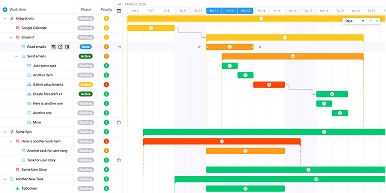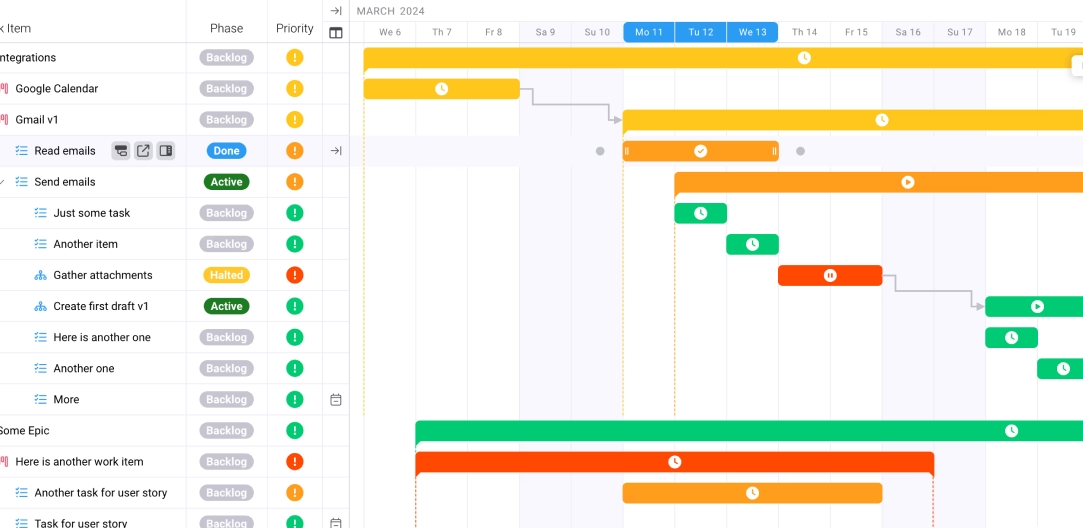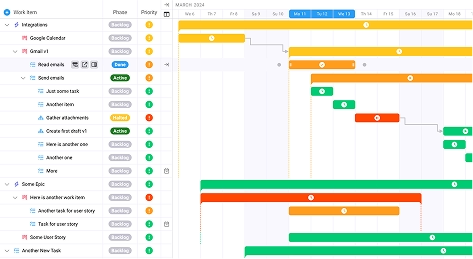
The 5 Best Alternatives to Basecamp in 2026
Key takeaways:
Looking for the best alternatives to Basecamp in 2026? You're not alone. While Basecamp pioneered simple project management, today's teams need more sophisticated tools that can scale with their growing demands. The project management software market stands at USD 9.76 billion in 2025 and is advancing at a 15.65% CAGR toward USD 20.20 billion by 2030, indicating a massive shift toward more powerful alternatives to Basecamp that offer enhanced collaboration, automation, and analytics capabilities.
Whether you're managing a marketing agency, consulting firm, or growing startup, finding the right project management solution is crucial for maintaining competitive advantage. The alternatives to Basecamp we'll explore offer everything from advanced resource planning to integrated time tracking and client portals—features that modern teams require for success.
The Current Challenge: Why Teams Are Moving Beyond Basecamp
Basecamp's minimalist approach served many teams well for years, but today's complex project landscapes demand more robust functionality. 79% of workers globally utilized digital collaboration tools in 2021, and this number has grown significantly as hybrid work models become standard.
The primary limitations teams encounter with Basecamp include:
Limited Customization and Scalability: Basecamp's one-size-fits-all approach doesn't accommodate the diverse workflows of different industries and team structures.
Lack of Advanced Project Views: Modern teams need Gantt charts, Kanban boards, and timeline views to visualize complex project dependencies effectively.
Insufficient Reporting and Analytics: 82% of SMBs expect to grow over the next 18 months, and 75% plan to increase their software spend, driving demand for detailed performance insights that Basecamp simply cannot provide.
Missing Resource Management Features: Teams struggle to allocate resources effectively without built-in capacity planning and workload balancing tools.
Integration Limitations: Over 67% of SMBs have integrated at least one cloud-based solution into their daily operations, requiring seamless connectivity that goes beyond Basecamp's basic integration capabilities.
Strategic Framework for Selecting Basecamp Alternatives
When evaluating alternatives to Basecamp, successful organizations follow a structured approach that considers both current needs and future growth trajectory. The most effective selection framework encompasses five critical evaluation dimensions:
Workflow Alignment: The chosen platform must accommodate your team's existing processes while offering flexibility for evolution. Strategic guidance for selecting project management tools for agency environments emphasizes the importance of matching software capabilities to specific operational requirements.
Collaboration Enhancement: Robust collaboration features are essential for team satisfaction and retention.
Scalability Planning: Your selected alternative should support growth without requiring disruptive migrations. Consider how each platform handles increased user loads, project complexity, and data volume.
Integration Ecosystem: Modern work requires seamless connectivity between tools. Evaluate each platform's ability to integrate with your existing software stack, including CRM systems, accounting software, and communication tools.
Return on Investment: Calculate both direct costs and productivity gains. The right alternative to Basecamp should deliver measurable improvements in project delivery speed, resource utilization, and client satisfaction.
Implementation Tactics: The 5 Best Alternatives to Basecamp
1. Ravetree: The All-in-One Professional Services Platform
Ravetree stands out among alternatives to Basecamp by specifically addressing the needs of professional services organizations. Unlike generic project management tools, Ravetree integrates project management, resource planning, time tracking, CRM, and billing into a unified platform designed for client-serving businesses.
Key Capabilities: Ravetree offers comprehensive project templates, advanced resource management, integrated time tracking with expense management, custom client portals, and detailed financial reporting. The platform excels at managing the complete client lifecycle from lead capture through project delivery and invoicing.
Ideal Use Cases: Marketing agencies, consulting firms, creative studios, and professional services organizations benefit most from Ravetree's specialized feature set. Agency-specific project management insights and tool recommendations demonstrate how purpose-built solutions deliver superior results compared to generic alternatives.
Competitive Advantages: Unlike other Basecamp alternatives, Ravetree eliminates the need for multiple software subscriptions by combining project management, CRM, and billing functionality. This integration reduces data silos and provides complete visibility into project profitability.
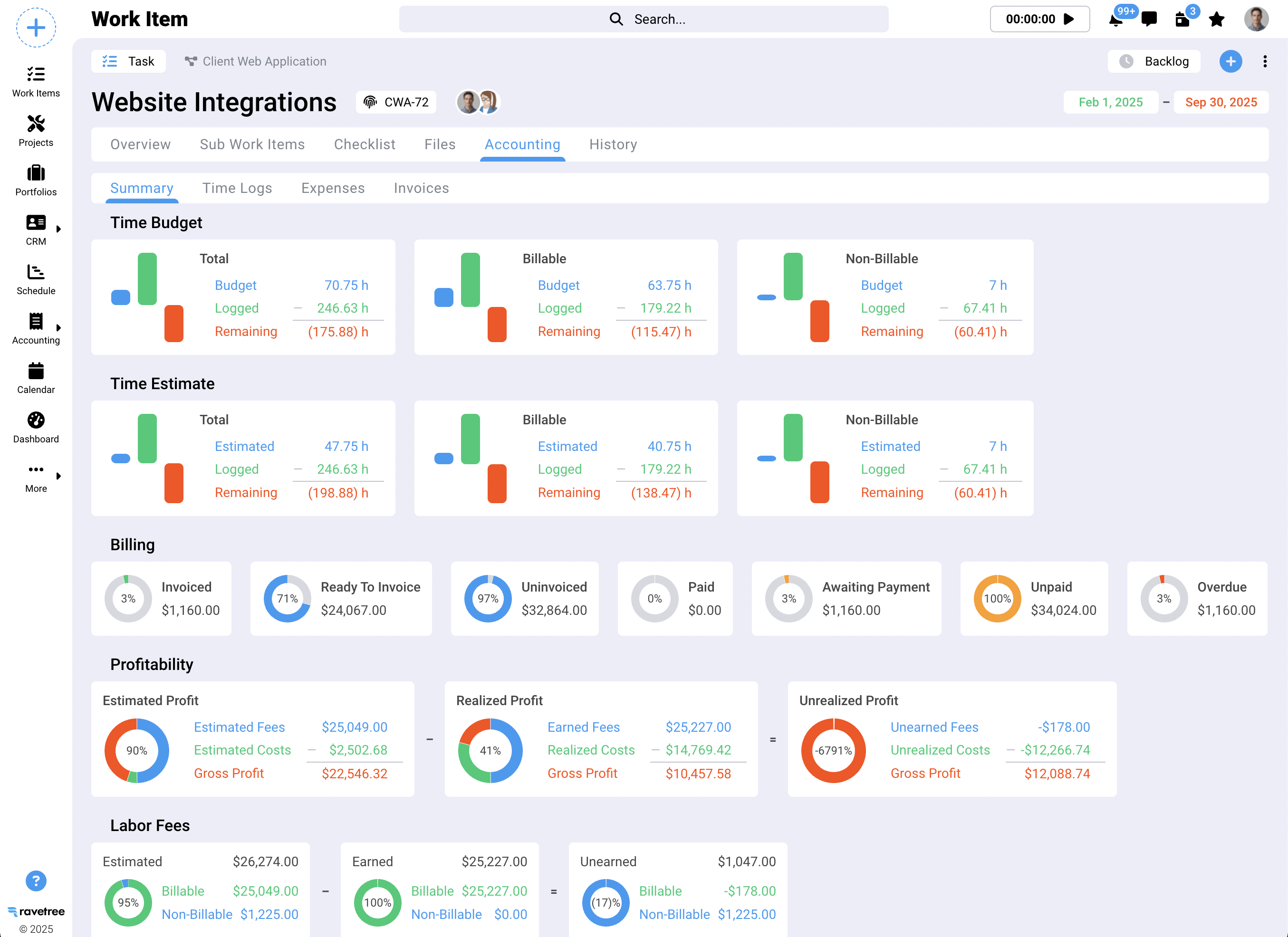
2. Asana: The Team Collaboration Powerhouse
Asana has evolved into one of the most comprehensive alternatives to Basecamp, offering powerful project visualization and team coordination capabilities. The platform excels at breaking down complex projects into manageable tasks while maintaining clear accountability chains.
Advanced Project Views: Asana provides multiple project perspectives including list view, board view, timeline (Gantt charts), and calendar view. This flexibility allows different team members to work with their preferred visualization method while maintaining unified data.
Automation and Workflows: The platform's automation features reduce manual work by automatically assigning tasks, updating project statuses, and sending notifications based on predefined triggers. Custom fields and forms enable teams to capture specific project requirements efficiently.
Collaboration Features: Real-time commenting, file attachments, and @mentions facilitate seamless communication within project context. The proofing feature allows creative teams to provide feedback directly on visual assets.
Scalability: Asana supports teams from small startups to large enterprises, with pricing tiers that accommodate different organizational needs and feature requirements.

3. Trello: The Visual Project Organization Tool
Trello's Kanban-based approach makes it an intuitive alternative to Basecamp for teams that prefer visual project management. The platform's simplicity belies powerful underlying functionality that supports sophisticated workflows.
Board-Based Organization: Trello's card and board system provides immediate visual understanding of project status. Teams can quickly identify bottlenecks and redistribute workload by observing card distribution across different stages.
Power-Ups and Integrations: The platform's extensibility through Power-Ups allows teams to add advanced features like time tracking, calendar views, and automation without overwhelming the core interface. Integration with tools like Slack, Google Drive, and Dropbox maintains workflow continuity.
Template Library: Pre-built templates for common project types accelerate setup time and ensure best practices implementation from project initiation.
Mobile Excellence: Trello's mobile applications provide full functionality, enabling team members to stay connected and update project status regardless of location.
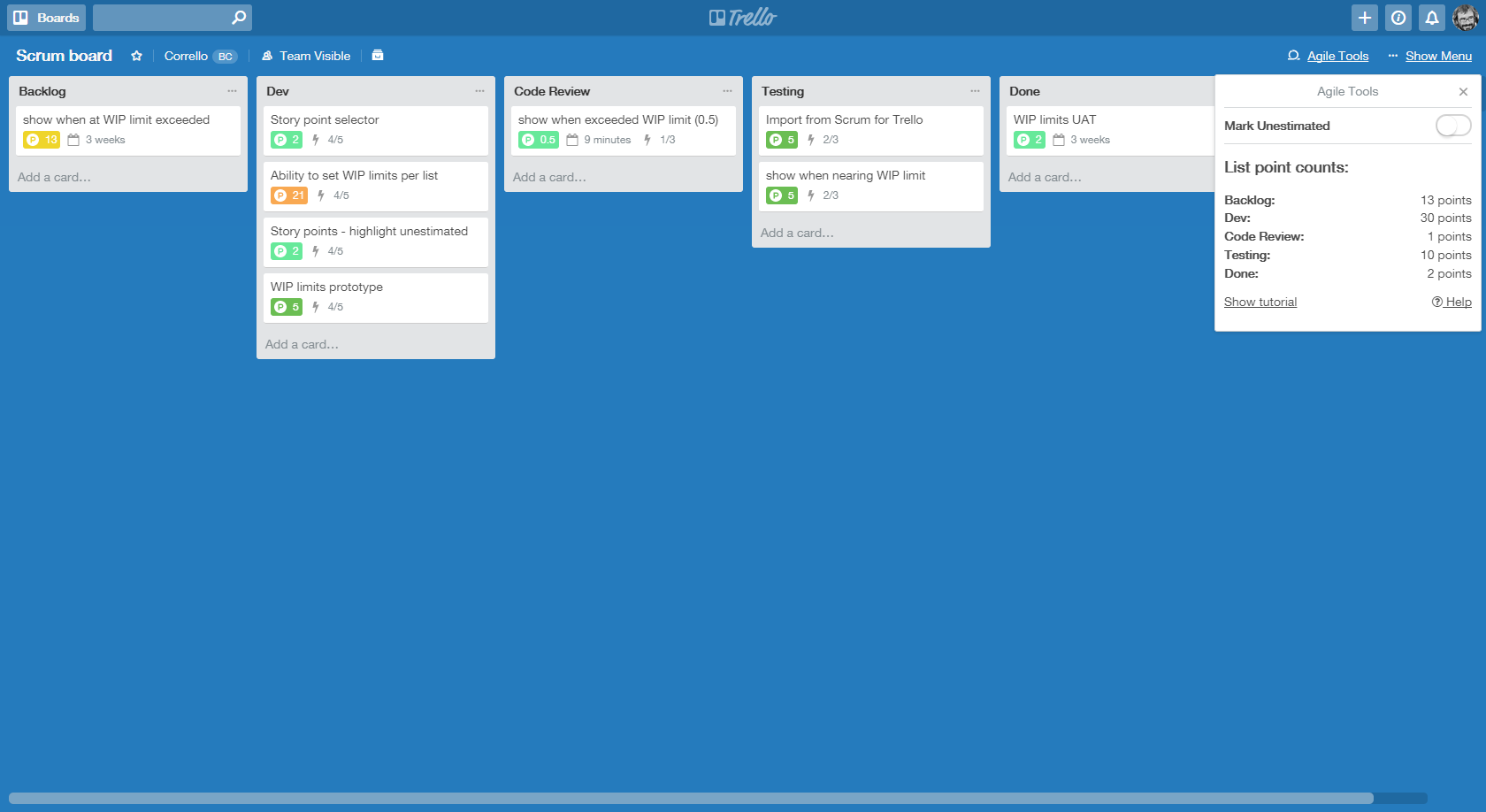
4. Monday.com: The Customizable Work Operating System
Monday.com positions itself as a work operating system rather than just a project management tool, making it a versatile alternative to Basecamp for organizations with diverse operational needs.
Customization Flexibility: The platform allows extensive customization of workflows, columns, and automation rules to match specific business processes. This adaptability makes it suitable for various industries and project types.
Visual Project Tracking: Color-coded status indicators, progress bars, and timeline views provide instant project health insights. Dashboard widgets offer executive-level summaries of key performance indicators.
Resource Management: Advanced resource planning features help teams optimize capacity allocation and identify potential conflicts before they impact project delivery.
Integration Ecosystem: Monday.com integrates with hundreds of third-party applications, ensuring seamless data flow between different business tools.

5. Teamwork: The Project Management Specialist
Teamwork offers robust project management capabilities specifically designed for professional services and project-based businesses, making it a strong alternative to Basecamp for teams requiring detailed project control.
Comprehensive Project Features: Teamwork provides task dependencies, milestone tracking, time logging, and expense management within a unified interface. Project templates accelerate setup for recurring project types.
Client Collaboration: Dedicated client access areas allow external stakeholders to view project progress, communicate with team members, and approve deliverables without compromising internal project data.
Portfolio Management: Executive dashboards provide portfolio-level visibility across multiple projects, enabling resource optimization and strategic decision-making.
Invoicing Integration: Built-in invoicing capabilities based on tracked time and expenses streamline the billing process for client-serving organizations.

Measuring Success: KPIs and Metrics That Matter
Implementing any of these alternatives to Basecamp should deliver measurable improvements across several key performance indicators. 85 percent of project managers have increased their use of emotional intelligence over the past two years, indicating the growing importance of people-focused metrics alongside traditional project metrics.
Project Delivery Metrics: Track on-time delivery rates, budget adherence, and scope change frequency. Successful Basecamp alternatives should improve these baseline metrics within the first quarter of implementation.
Team Productivity Indicators: Monitor task completion rates, collaboration frequency, and time-to-completion for similar project types. The global team collaboration software market size was valued at USD 36,114.2 million in 2024 and is expected to grow at a CAGR of 7.4% from 2025 to 2030, reflecting the direct correlation between collaboration tools and organizational productivity.
Client Satisfaction Benchmarks: Measure client communication frequency, approval cycle times, and overall satisfaction scores. The right alternative should enhance client relationships through improved transparency and communication.
Resource Utilization Rates: Track team member capacity utilization, project profitability, and resource allocation efficiency. These metrics directly impact organizational profitability and growth capacity.
System Adoption Metrics: Monitor user login frequency, feature utilization rates, and training completion to ensure successful platform adoption across the organization.
Future Considerations: Emerging Trends in Project Management
The landscape of alternatives to Basecamp continues evolving rapidly as technology advances and work patterns shift. Remote job postings grew by 8% in Q2 2025, with computer & IT, communications, and project management seeing notable surges, indicating the growing importance of tools that support distributed teams effectively.
Artificial Intelligence Integration: Future alternatives will increasingly incorporate AI for predictive project analytics, automated task assignment, and intelligent resource optimization. These capabilities will help teams anticipate problems before they occur and make data-driven decisions about project prioritization.
Enhanced Remote Collaboration: 83% of global employees prefer a hybrid work environment that offers a mix of in-office and remote days, driving demand for tools that seamlessly support both synchronous and asynchronous collaboration patterns.
Advanced Analytics and Reporting: Organizations require increasingly sophisticated insights into project performance, team productivity, and resource utilization. Future alternatives will provide predictive analytics that help teams optimize performance proactively.
Industry-Specific Solutions: Benefits of all-in-one work management platforms for client service businesses will become more pronounced as platforms develop specialized features for specific industries and use cases.
Integration Ecosystem Expansion: Seamless connectivity with emerging tools and technologies will become essential as organizations adopt more specialized software for different business functions.
Conclusion
The alternatives to Basecamp in 2026 offer significantly more sophisticated capabilities than ever before, addressing the complex needs of modern teams while maintaining user-friendly interfaces. From Ravetree's comprehensive professional services platform to the customizable flexibility of Monday.com, each alternative provides unique advantages for different organizational contexts.
The key to success lies in selecting the alternative that best aligns with your team's specific workflow requirements, growth trajectory, and technical needs. Whether you prioritize visual project tracking, advanced resource management, or integrated billing capabilities, the alternatives to Basecamp we've explored offer powerful solutions that can transform how your team collaborates and delivers results.
Don't settle for outdated project management approaches when these robust alternatives can unlock your team's full potential. Evaluate your specific requirements, test the platforms that align with your needs, and make the transition to a more capable alternative to Basecamp that will support your organization's success for years to come.
Frequently Asked Questions
What makes these alternatives better than Basecamp for modern teams?
These alternatives offer advanced features like resource management, detailed analytics, multiple project views (Gantt charts, Kanban boards), and extensive integrations that Basecamp lacks, making them more suitable for complex project requirements.
How do I choose between different alternatives to Basecamp?
Consider your team size, industry requirements, need for customization, budget constraints, and required integrations. Professional services firms benefit from specialized solutions like Ravetree, while teams needing maximum flexibility might prefer Monday.com.
What's the typical implementation timeline for switching from Basecamp?
Most organizations complete the transition within 4-6 weeks, including data migration, team training, and workflow optimization. The timeline varies based on project complexity and team size.
Do these alternatives integrate with existing business tools?
Yes, all featured alternatives offer extensive integration capabilities with popular business tools including CRM systems, accounting software, communication platforms, and file storage solutions.
What ROI can teams expect from switching alternatives?
Organizations typically see 20-30% improvements in project delivery speed, 15-25% increases in resource utilization efficiency, and significant improvements in client satisfaction within the first quarter.
Are these alternatives suitable for remote and hybrid teams?
Absolutely. All alternatives are designed with remote collaboration in mind, offering real-time updates, mobile accessibility, and asynchronous communication features that support distributed teams effectively.
How do pricing models compare between these alternatives and Basecamp?
Pricing varies significantly based on features and team size. While some alternatives may have higher per-user costs, they often provide better value through integrated functionality that eliminates the need for multiple software subscriptions.
What level of technical expertise is required for implementation?
Most alternatives offer intuitive interfaces that require minimal technical expertise. However, organizations benefit from designating platform administrators who can optimize workflows and manage integrations effectively.


